| Weight | 1 lbs |
|---|---|
| Dimensions | 9 × 5 × 2 in |
| host | rabbit |
| isotype | IgG |
| clonality | polyclonal |
| concentration | 1 mg/mL |
| applications | ICC/IF, WB |
| reactivity | Caspase-10 (CT) |
| available sizes | 100 µg |
rabbit anti-Caspase-10 (CT) polyclonal antibody 3094
$445.00
Antibody summary
- Rabbit polyclonal to Caspase-10 (CT)
- Suitable for: ELISA,WB,IF,ICC
- Isotype: IgG
- 100 µg
rabbit anti-Caspase-10 (CT) polyclonal antibody 3094
| antibody |
|---|
| Tested applications WB,IHC,IHC,ICC/IF,ELISA |
| Recommended dilutions Immunoblotting: use at 1ug/mL. These are recommended concentrations. Enduser should determine optimal concentrations for their applications. Positive control: Whole cell lysate from HeLa cells. |
| Immunogen Peptide corresponding to aa 505-521 at C-terminus of human FLICE2 (accession no. AAD28402). |
| Size and concentration 100µg and lot specific |
| Form liquid |
| Storage Instructions This antibody is stable for at least one (1) year at -20°C. Avoid multiple freeze-thaw cycles. |
| Storage buffer PBS, pH 7.4. |
| Purity peptide affinity purification |
| Clonality polyclonal |
| Isotype IgG |
| Compatible secondaries goat anti-rabbit IgG, H&L chain specific, peroxidase conjugated, conjugated polyclonal antibody 9512 goat anti-rabbit IgG, H&L chain specific, biotin conjugated polyclonal antibody 2079 goat anti-rabbit IgG, H&L chain specific, FITC conjugated polyclonal antibody 7863 goat anti-rabbit IgG, H&L chain specific, Cross Absorbed polyclonal antibody 2371 goat anti-rabbit IgG, H&L chain specific, biotin conjugated polyclonal antibody, crossabsorbed 1715 goat anti-rabbit IgG, H&L chain specific, FITC conjugated polyclonal antibody, crossabsorbed 1720 |
| Isotype control Rabbit polyclonal - Isotype Control |
| target relevance |
|---|
| Protein names Caspase-10 (CASP-10) (EC 3.4.22.63) (Apoptotic protease Mch-4) (FAS-associated death domain protein interleukin-1B-converting enzyme 2) (FLICE2) (ICE-like apoptotic protease 4) [Cleaved into: Caspase-10 subunit p23/17; Caspase-10 subunit p12] |
| Gene names CASP10,CASP10 MCH4 |
| Protein family Peptidase C14A family |
| Mass 58951Da |
| Function FUNCTION: Involved in the activation cascade of caspases responsible for apoptosis execution. Recruited to both Fas- and TNFR-1 receptors in a FADD dependent manner. May participate in the granzyme B apoptotic pathways. Cleaves and activates effector caspases CASP3, CASP4, CASP6, CASP7, CASP8 and CASP9. Hydrolyzes the small- molecule substrates, Tyr-Val-Ala-Asp-|-AMC and Asp-Glu-Val-Asp-|-AMC. {ECO:0000269|PubMed:11717445, ECO:0000269|PubMed:16916640}.; FUNCTION: Isoform 7 can enhance NF-kappaB activity but promotes only slight apoptosis. {ECO:0000269|PubMed:17822854}.; FUNCTION: Isoform C is proteolytically inactive. {ECO:0000269|PubMed:11717445}. |
| Catalytic activity CATALYTIC ACTIVITY: Reaction=Strict requirement for Asp at position P1 and has a preferred cleavage sequence of Leu-Gln-Thr-Asp-|-Gly.; EC=3.4.22.63; Evidence={ECO:0000269|PubMed:16916640}; |
| Tissues TISSUE SPECIFICITY: Detectable in most tissues. Lowest expression is seen in brain, kidney, prostate, testis and colon. |
| Structure SUBUNIT: Heterotetramer that consists of two anti-parallel arranged heterodimers, each one formed by a 23/17 kDa (p23/17) (depending on the splicing events) and a 12 kDa (p12) subunit (By similarity). Self-associates. Interacts with FADD and CASP8. Found in a Fas signaling complex consisting of FAS, FADD, CASP8 and CASP10. Interacts with RFFL and RNF34; negatively regulate CASP10 through proteasomal degradation. Interacts with RIOK3. {ECO:0000250, ECO:0000269|PubMed:11717445, ECO:0000269|PubMed:15069192, ECO:0000269|PubMed:19557502}. |
| Post-translational modification PTM: Cleavage by granzyme B and autocatalytic activity generate the two active subunits. |
| Involvement in disease DISEASE: Autoimmune lymphoproliferative syndrome 2A (ALPS2A) [MIM:603909]: A disorder of apoptosis that manifests in early childhood and results in the accumulation of autoreactive lymphocytes. It is characterized by non-malignant lymphadenopathy with hepatosplenomegaly, and autoimmune hemolytic anemia, thrombocytopenia and neutropenia. {ECO:0000269|PubMed:10412980}. Note=The disease is caused by variants affecting the gene represented in this entry.; DISEASE: Familial non-Hodgkin lymphoma (NHL) [MIM:605027]: Cancer that starts in cells of the lymph system, which is part of the body's immune system. NHLs can occur at any age and are often marked by enlarged lymph nodes, fever and weight loss. {ECO:0000269|PubMed:12010812}. Note=The gene represented in this entry is involved in disease pathogenesis.; DISEASE: Gastric cancer (GASC) [MIM:613659]: A malignant disease which starts in the stomach, can spread to the esophagus or the small intestine, and can extend through the stomach wall to nearby lymph nodes and organs. It also can metastasize to other parts of the body. The term gastric cancer or gastric carcinoma refers to adenocarcinoma of the stomach that accounts for most of all gastric malignant tumors. Two main histologic types are recognized, diffuse type and intestinal type carcinomas. Diffuse tumors are poorly differentiated infiltrating lesions, resulting in thickening of the stomach. In contrast, intestinal tumors are usually exophytic, often ulcerating, and associated with intestinal metaplasia of the stomach, most often observed in sporadic disease. {ECO:0000269|PubMed:11973654}. Note=The gene represented in this entry is involved in disease pathogenesis. |
| Target Relevance information above includes information from UniProt accession: Q92851 |
| The UniProt Consortium |
Data
Publications
| pmid | title | authors | citation |
|---|---|---|---|
| We haven't added any publications to our database yet. | |||
Protocols
| relevant to this product |
|---|
| Western blot IHC ICC |
Documents
| # | SDS | Certificate | |
|---|---|---|---|
| Please enter your product and batch number here to retrieve product datasheet, SDS, and QC information. | |||
Only logged in customers who have purchased this product may leave a review.

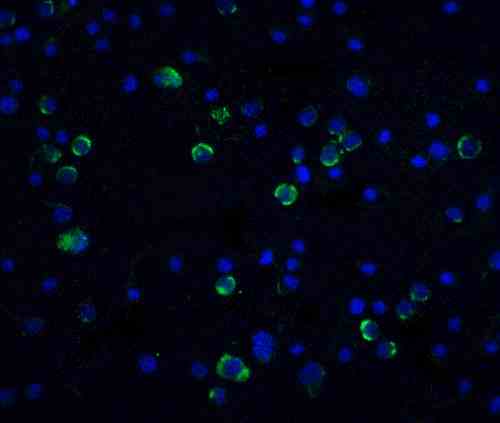
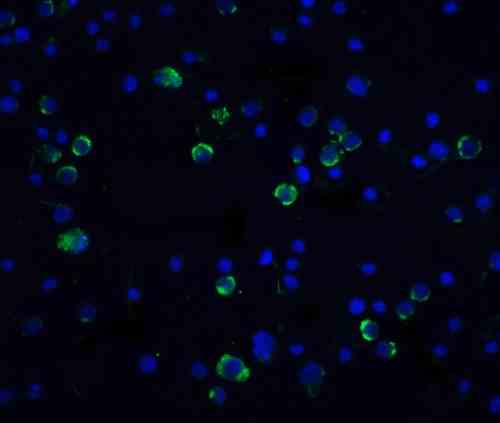

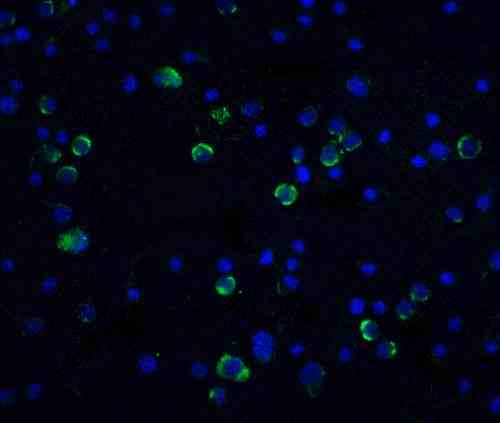
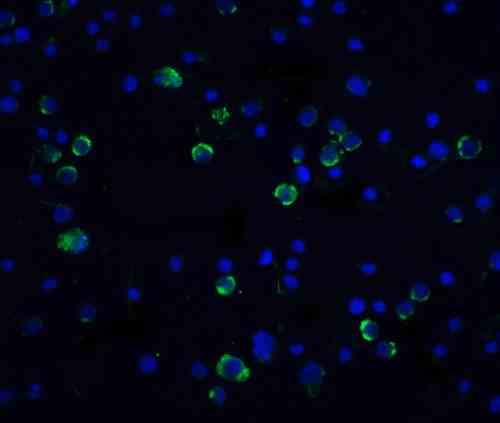
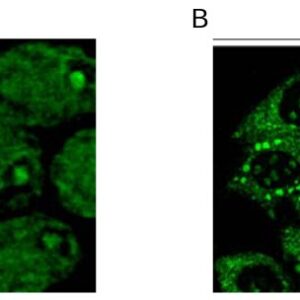
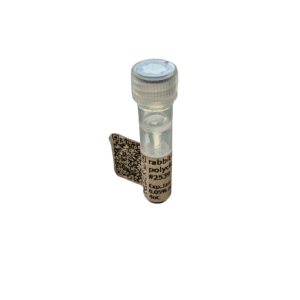
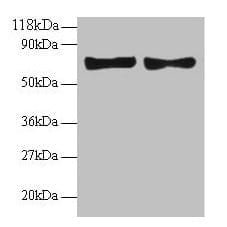
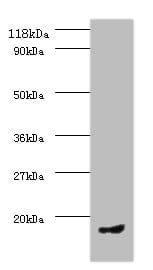

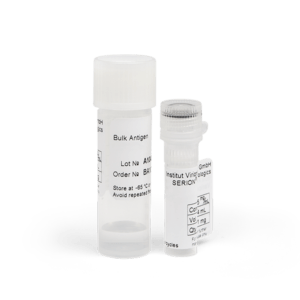
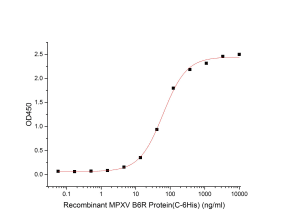
Reviews
There are no reviews yet.